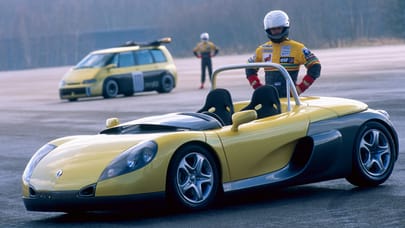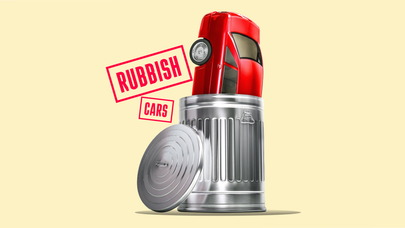
Coupe shootout: CR-Z vs RCZ
You wait ages for a chic little urban coupe, and then two come along at once...


Death to cows! If you want to make an environmental Difference, science proves that obliterating a herd of happy Friesians is the answer. Green coupes are not the answer. Green coupes will not make a Difference. The reduction in the size of your eco-footprint if you choose a Peugeot RCZ or a Honda CR-Z over, say, a Ford Focus RS or even a Porsche Cayenne is, in the grand scheme, negligible. Nothingy. Certainly far more negligible and nothingy than the environmental benefit of immolating a dozen innocent, saucer-eyed cows.
Words: Sam Philip
Photos: Lee BrimbleAdvertisement - Page continues below
Which means we can dismiss the frequent and lazy assertion that these cars exist to cater to the eco-conscious. The notion of eco-conscience is rubbish. People will not buy these cars to ensure the continued habitat of a fluffy penguin. It's all about money. These cars are about having a bit of fun and looking good on the road without being reduced to a weeping heap at the fuel pump or when renewing your tax disc.
On that score, the RCZ and CR-Z are closely matched. They might approach the Reasonably Economical Coupe problem from almost opposite directions, the hybrid Honda and the diesel Peugeot, but these two cars have ended up - statistically at least - in a similar place. What we have is a pair of front-drive coupes that'll manage over 50mpg (according to official figures at least, on which more in a tick), run from 0-60mph in a bit under 10 seconds and cost around £20,000.

The CR-Z is the more... hang on. Sorry. Best to get this out the way nice and early: this twin-test does have the potential to get a bit confusing, on account of the anagram-name thing of the two cars. At this point, I should tell you that I've devised a clever rhyme to banish this confusion (‘C before R, it's a Honda-made car!') or that I'm going to refer to the two cars by spurious but entirely dissimilar nicknames. But I'm not. And I haven't. Confusion shall reign.
Advertisement - Page continues below
The CR-Z is the more exotic recipe. Honda bills it as the world's first hybrid sports car. This should be an oxymoron, in theory. Sports cars are about lightness and agility; bolting an electric motor and batteries to a conventional combustion engine adds weight. But Honda's Integrated Motor Assist is a simple, compact unit: a small electric motor sitting between engine and gearbox, plus a stack of nickel hydride batteries under the boot floor adding just 60kg to the CR-Z's kerbweight.

Like the Insight - from which the CR-Z borrows much of its electrical cleverness - this car won't run on battery power alone, instead using the electric motor to supplement the power from the 1.5-litre petrol engine. In essence, it acts like a supercharger, adding 14bhp and 58lb ft of torque from very low revs. Peak combined power arrives at just 1,500rpm, which makes sense from a performance perspective: Honda's naturally aspirated VTEC engines have traditionally been rev-hungry but painfully lacking in low-end torque. With a combined 122bhp and 128lb ft, Honda claims a 0-62mph time of 9.9 seconds, which does seem to be pushing the ‘sports car' definition somewhat.

The Peugeot has a more traditional method for boosting power from its diesel engine: a turbocharger. It's a meaty engine, this, developing 163bhp and a hefty 236lb ft. The RCZ can't, on paper at least, quite match the CR-Z's frugality, returning 53mpg to the Honda's 56mpg, but it's a fair whack quicker, hitting 62mph in a bit under nine seconds and going 10mph quicker if you find the right bit of derestricted autobahn.

So in a drag race, the Honda will get a good look at the RCZ's arse - no bad thing. Aesthetic judgments are highly personal and subjective, of course, but if the Peugeot's double-bubble roof doesn't make you all warm and fuzzy, you're officially dead inside. Some unkinder members of the TopGear office have christened the RCZ a BOBFOC - a secondary-school acronym, for the unfamiliar, for Body Off Baywatch, Face Off Crimewatch. It isn't that bad from the front, in truth, but that big scary face doesn't seem to quite match up with its pert, perfectly realised rear.
Advertisement - Page continues below
With its retro lines and delicate, chiselled front end, the Honda is no uggo, but it's the Peugeot that gets more attention as we wing through the London night. Maybe it's the classic coupe profile - the RCZ is slightly longer, lower and wider than the hatchy Honda - or maybe it's the association of the CR-Z's rear aero deck to the dullfests that are the Prius and Insight. Maybe it's sheer surprise that, at long last, Peugeot has built something that isn't a bit of a minger.

And, in real world, mallet-footed driving, every bit as economical as the Honda. Our patented breed of erratic roadsmanship returned exactly 43mpg from both coupes. We could have got more from the CR-Z if we'd been prepared to leave it in ‘eco' mode, activated by a switch to the right of the steering wheel that lights up the speedo in a calming shade of green, dulls throttle response to save fuel and apparently replaces the petrol engine with the wizened lungs of an asthmatic shrew.
Eco mode is unbearably, agonisingly slow. Far better to switch the CR-Z into sport mode, which unleashes the mighty fury of 122bhp and bathes the binnacles in an angry red glow. This is presumably to admonish you for thinking Bad Fast Thoughts, a plainly illogical plan. If you've got the rage, the last thing you need is a red display goading you on. Goaded we were.
Advertisement - Page continues below
The RCZ doesn't goad. But it is, by the standards of recent Peugeots, a bloody revelation on the road. There's almost no body roll but masses of grip, the RCZ staying flat and seeming to pivot from its rear wheels through corners. When you get to the limits of adhesion, it lets go gradually instead of resorting to Peugeot's traditional chronic understeer. OK, this diesel RCZ isn't quite as light of nose as the petrol version, but it's still neatly balanced. There's a solidity and weight to all the controls that makes the Peugeot a chilled-out thing to drive fast or slow.

The Honda is a lighter, pointier drive. It isn't quite as planted as the Peugeot, squishing a little into corners, but the steering is quick and direct, the six-speed manual gearbox - the first ever fitted to a hybrid - beautifully crisp. It rides firmly without turning crashy, but the CR-Z isn't, despite Honda's affirmations, very sporty. It simply isn't quick enough. A car doesn't have to be fast to be fun, true, but the CR-Z is just too slow to get the ventricles pumping. Another 20bhp, or maybe a bit more low-end kick from the electric motor, would do the job, but things are too sedate at present.

Both coupes are described as 2+2-seaters, but there's no specification of what species the Plus Two should be. Not humans, it must be assumed, or at least not full-sized humans: neither back seat is suitable for anyone but the most masochistic of passengers. There's a fraction more headroom in the Honda - passengers in the Peugeot will soon discover exactly what noise a skull makes upon impact with a double-bubble glass roof - but both are useless for trips longer than a few metres. If you need to carry three or four on a regular basis and you're set on the coupe, better look at the Scirocco. Though the Peugeot boasts a giant boot, it's the Honda that offers the more usable space, its rear seats folding down to create a decent-size load bed.

To say the Honda suffers from a severe blind spot is inaccurate. It is more correct to say that its rear view benefits from a small non-blind spot. The CR-Z's B- and C-pillars all but obliterate the view out back, the mid-mounted spoiler cutting straight across the middle of the back window. If you're buying a CR-Z, first tick on the options list must be rear parking sensors. And then you must rip out the stop-start function with your bare hands before your new car hurls you into a rage.

It really is that bad. You're coasting towards a halt in traffic in the CR-Z. You slip the gearbox into neutral. But the traffic starts to move again, so you dip the clutch and engage first gear... but the engine has switched itself off and won't re-engage, leaving you coasting to a halt with traffic blaring around you. To restart the engine, you have to bang the clutch all the way down to the end of its travel, and who drives like that? It is an intensely, painfully irritating flaw that puts the Honda firmly on the back foot in this twin-test.

But it's the Peugeot's gorgeous cabin that delivers a haymaker to the CR-Z's pointy chin. In truth, it's a slightly unfair match-up here: our test RCZ is a top-spec ‘GT' version, while the CR-Z is a mid-grade Sport model, so inevitably the Peugeot gets tasty leather and a smart satnav where the Honda makes do with sensible plastics. But even the top-spec Honda can't match the RCZ for desirability of interior. It's a truly classy cabin, with every detail - from the jewellish analogue clock to the immaculate stitching of the leather door trim - reeking of understated class. I can't think of another car under £30,000 to deliver a similar level of luxury.

The Honda is a fine car, handsome and decent to drive, if perhaps a touch short of Honda's claims of a truly sporting hybrid. But the Peugeot - as well as feeling fantastically coherent, with every surface and control fitting together into a harmonious whole - is just... special. In a good way. It's a car that, each time you glance over its wavy backside, each time you get in it, cheers you up. It won't help the environment like a bout of bovine elimination, but it makes the world a little bit better.
Trending this week
- 2026 TopGear.com Awards
"Drives like a BMW ought to": why the iX3 is Top Gear's 2026 Car of the Year







